How to Safely Access Facebook in China: 5 Methods in 2026
- How To Access Facebook in China — 5 Easy Methods
- Using an eSIM
- Using International Roaming
- Using a VPN
- Using a Proxy (Shadowsocks)
- Using Tor Browser
- Why You Can't Access Facebook (and Messenger) in China
- Our Methodology for Testing Solutions for Accessing Facebook in China
- How To Stay Safe While Using Facebook in China
- FAQs on Using Facebook in China
One of most tourists' biggest worries when they plan a trip to China is whether they’d be able to use Facebook to stay in touch with their friends and family members. Many just plan on skipping a local SIM entirely and rely on Facebook for their calls.
Can you use Facebook in China as a tourist? Well, not directly. On the mainland China networks, Facebook and Messenger are blocked, along with other major platforms like Instagram and WhatsApp. That’s why so many first-time travelers end up frustrated or scrambling for alternatives like WeChat. With over 1.3 billion active users, WeChat can be tempting to try too1.
That said, the good news is that you don’t have to be cut off from Facebook. With the right setup, it’s possible to keep using Facebook safely in China. In this guide, I’ll walk you through 5 methods to get Facebook working again. Whether you’re on a short trip, studying abroad, or living in China long-term, you’ll know exactly how to prepare and which method fits your situation best.
Short on Time? Here Are the Best Ways To Access Facebook in China in 2026
Here’s a quick overview of the most reliable ways travelers stay connected to Facebook in China today. Each method comes with its own pros and cons, so the right choice depends on whether you’re visiting for a week, staying long-term, or need Facebook for work.
| Method | Pros | Cons |
| Use a Global/Regional eSIM | ✅ Works immediately after activation ✅ Reliable for Facebook, Messenger, and calls |
❌ Data packages can be expensive ❌ Not ideal for long-term use |
| Use International Roaming (Home Carrier) | ✅ No new apps or setup required ✅ Often routes traffic outside mainland China |
❌ Usually the most costly option ❌ Daily data caps or throttling may apply |
| Use a VPN With Robust Obfuscation | ✅ Adds strong security with encryption | ❌ Setup can be tricky for first-timers ❌ Some VPNs struggle on hotel, school, or office WiFi |
| Using a Proxy (Shadowsocks) | ✅ Lightweight and fast for browsing | ❌ Technical to configure ❌ Limited support for apps like Messenger calls |
| Using Tor Browser | ✅ Extra protection while browsing | ❌ Very slow for Facebook or video calls ❌ Needs bridges and extra setup to connect in China |
How To Access Facebook in China — 5 Easy Methods
There’s no single “best” way to get Facebook working in China. What works best for you depends on whether you’re traveling for a short trip, studying abroad, or living there long-term. Some methods are simple but pricey, while others take a little setup but give you more reliability.
Here are the 5 easiest ways people keep in touch on Facebook and Messenger in China:
Using an eSIM
For most tourists and short-term visitors, an eSIM is the easiest way to get Facebook working in China. It doesn’t require any special apps or a confusing setup process (basically plug and play), and once activated, you can use Facebook, Messenger, Instagram, and WhatsApp like you normally would.
1. Get an eSIM
Choose a global or regional eSIM that routes data outside mainland China. Popular options that work well include Holiday, Saily, and Airalo.
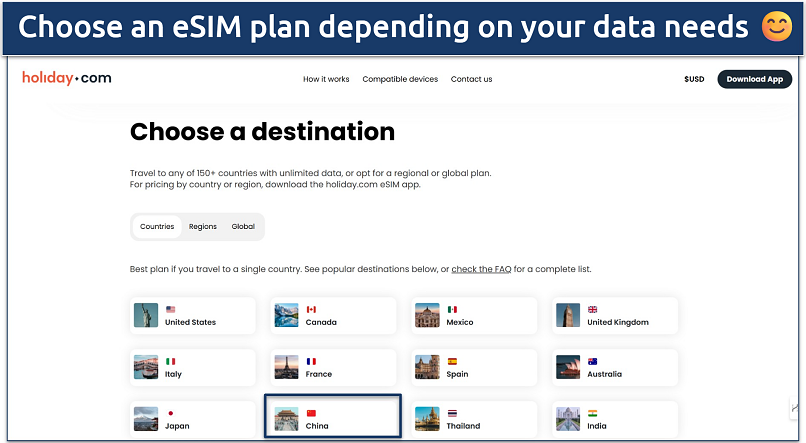 Most eSIM providers have shorter 3-5 day plans for a quick trip to China
Most eSIM providers have shorter 3-5 day plans for a quick trip to China
2. Install It Before Your Trip
The best time is a day or just a few hours before departure. Some providers recommend doing this in advance, as this process requires a stable internet connection. That way, you won’t stress about it in the airport lounge, restaurant, or hotel, so this is quite a time-saver.
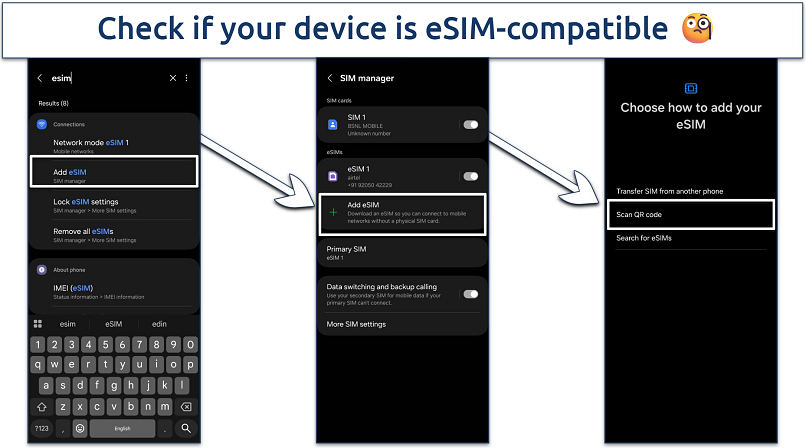 Carriers like Google Fi and Verizon often require their dedicated apps to activate an eSIM
Carriers like Google Fi and Verizon often require their dedicated apps to activate an eSIM
3. Connect to the Network
Most eSIMs activate when they detect and connect to a supported network at your destination. This means your eSIM will start working once you arrive in China. Until then, it just sits dormant on your phone. So, unless the plan explicitly says “timer starts on install,” you can safely install early.
For manual activation, follow your provider’s instructions — this may include entering APN (Access Point Name) or manually selecting a partner carrier.
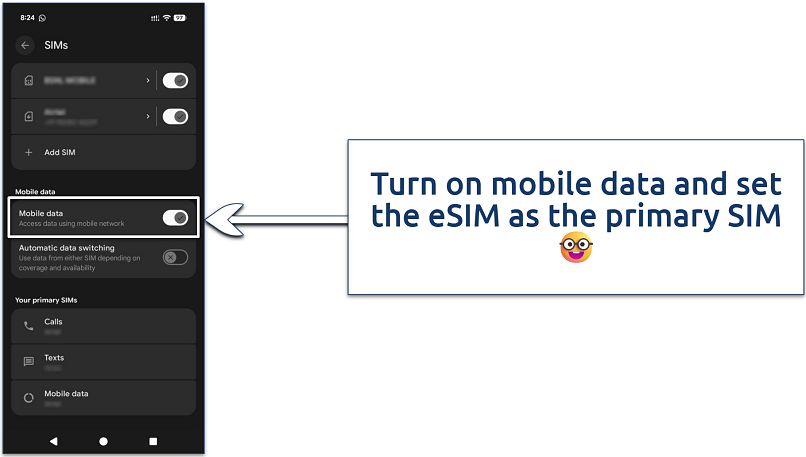 Turn off automatic data switching to avoid losing internet access
Turn off automatic data switching to avoid losing internet access
Enabling mobile data lets your phone use the eSIM for internet access, while turning on roaming allows it to connect to foreign networks. It’s also a good idea to set the eSIM as primary so all apps, maps, and browsing run on it instead of your home SIM.
4. Start Browsing
Open Facebook or Messenger, and you should be able to post updates, send messages, and make calls without being blocked.
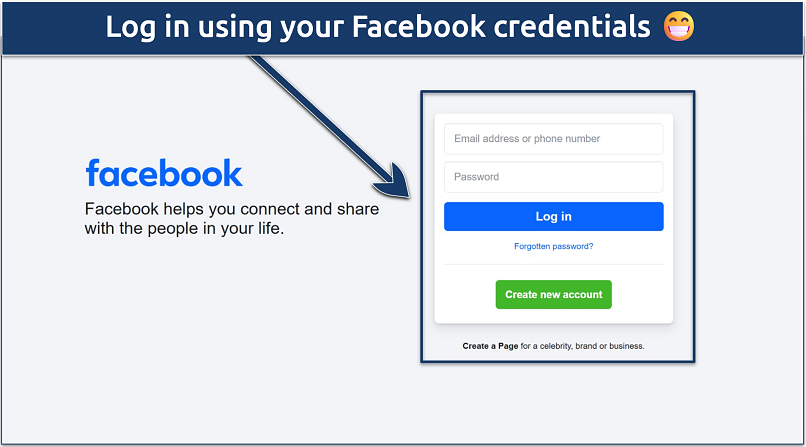 You can also create a new account to be extra safe when using Facebook in China
You can also create a new account to be extra safe when using Facebook in China
Using International Roaming
If you don’t want to set up a new eSIM, you can often keep Facebook working in China by activating international roaming with your current mobile carrier. Many carriers route data through your home network, which means Facebook and Messenger stay accessible even when you’re in China.
Here’s the step-by-step guide to using international roaming in China:
1. Activate Roaming Before Your Trip
Contact your carrier or log in to your account to enable international roaming. Plans like AT&T Day Pass or Google Fi Wireless typically need to be turned on in advance.
2. Check the Costs
Roaming is usually more expensive than using an eSIM, with daily or per-GB fees, so confirm the charges before you travel.
3. Turn It On When You Land
Once in China, enable mobile data and data roaming on your phone. Make sure your primary SIM is selected as the active data line. Roaming is disabled by default on most phones to avoid surprise charges.
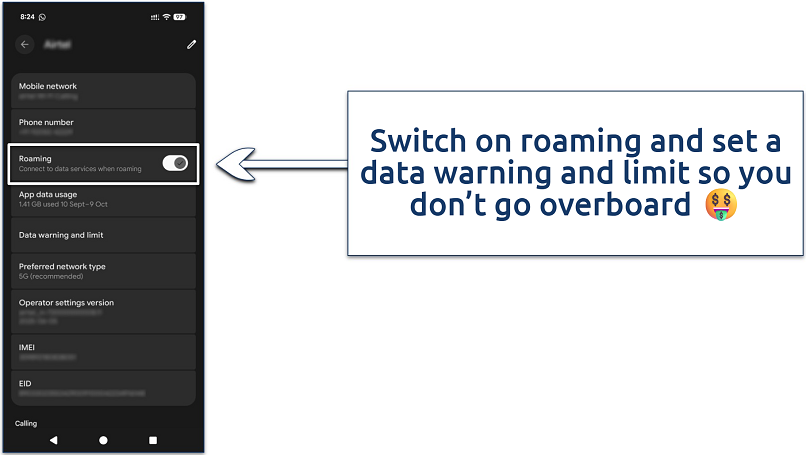 Set your preferred connection to 5G for the fastest speeds in China
Set your preferred connection to 5G for the fastest speeds in China
4. Use Facebook as Normal
Facebook, Messenger, and other Meta apps should load without being blocked, as the connection is routed outside the mainland China networks.
Using a VPN
A VPN is the most flexible option if you’re in China for longer than a quick trip. The key is choosing a VPN that’s reliable in China and has features designed to keep connections stable.
Here’s the step-by-step guide to using a VPN in China:
1. Download a Reliable VPN Before You Travel
Some app stores and VPN websites are blocked in China, so downloading before your trip is essential. Still, a few top VPNs for China offer mirror websites that let you download their apps when you’re already in the country.
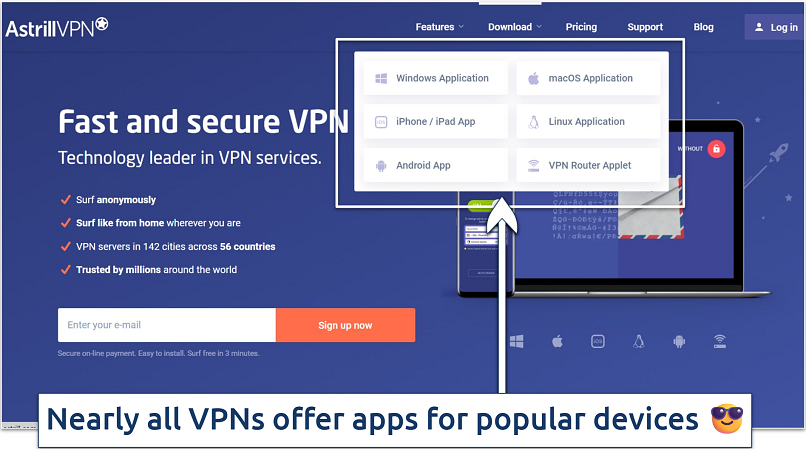 Install the correct app for your device and follow the on-screen instructions
Install the correct app for your device and follow the on-screen instructions
2. Enable Important VPN Features for Optimal Performance
This is essential to maintain a stable connection and protect your data while in the country. Open the VPN settings and turn on obfuscation (sometimes called stealth mode or stealthVPN). This feature disguises your encrypted connection as regular traffic to avoid detection. With some VPN, you may need to switch to specific protocols for this feature to work.
Also, confirm your VPN is keeping your IP/DNS/WebRTC under wraps. And don’t forget to enable the kill switch — it stops your internet traffic if your VPN accidentally disconnects. Personally, I don’t use a VPN without it.
3. Connect to a Server
Select a server location close to China for better speeds. Good options include Hong Kong, Japan, or Singapore. Always turn on the VPN before opening any browser or app so all your traffic stays protected.
4. Use Facebook Safely
Once connected, open Facebook or Messenger in your browser or app, and you should be able to post updates, message friends, or join calls without issues.
Quick Comparison Table: Best VPNs for Safely Accessing Facebook in China
Not every VPN works reliably in China. The ones that do usually offer obfuscation features, fast nearby servers, and strong privacy tools. Here’s a quick look at the VPNs that have proven most dependable for maintaining access to Facebook and other websites blocked in China:
Using a Proxy (Shadowsocks)
Shadowsocks is a proxy tool that many long-term expats and developers use in China. It’s lighter than a VPN and can sometimes be faster for browsing Facebook, though it takes more effort to set up. Unlike a VPN, Shadowsocks mainly works at the application level, which means it may not cover every app on your device.
Here’s a step-by-step guide to using Shadowsocks in China:
1. Get Access to a Shadowsocks Server
This usually requires buying or renting access from a provider that offers working servers outside of China.
2. Install a Shadowsocks Client
Download the client for your device (Windows, macOS, Android, or iOS) and import the server details.
3. Configure the Connection
Set up the proxy settings and choose the apps or browsers you want to route through Shadowsocks.
4. Use Facebook
Once connected, open Facebook or Messenger in your chosen browser or device to get access to your account.
Using Tor Browser
Tor is another option for accessing Facebook in China, though it’s the least convenient. The Tor network routes your connection through multiple relays to anonymize traffic. While it works well in some countries, in China, Tor is often blocked by default, so we don’t recommend using it. To make it work, you’ll need to use special bridges, and even then, the speed is usually too slow for activities like Messenger calls or video browsing.
These are the steps to use Tor in China:
1. Download Tor Before Your Trip
The official site may not load once you’re in China, so install the browser in advance.
2. Set Up Bridges
As Tor connections are blocked on many networks, you’ll need to configure bridges to disguise your traffic.
3. Connect to the Network
Open the Tor Browser and allow it to connect to the Tor network using your bridge configuration.
4. Access Facebook
Log in through the Tor Browser to use Facebook, though expect slower speeds and delays.
Why You Can't Access Facebook (and Messenger) in China
Facebook, Messenger, and other Meta-owned platforms have been blocked in mainland China since 20092. The ban came after unrest in Xinjiang, where Facebook was reportedly used to organize protests, leading authorities to restrict access under the country’s internet control policies. Since then, the block has never been lifted.
This is part of China’s broader internet filtering system (Great Firewall of China). It not only blocks major social media platforms like Facebook, Instagram, and X (Twitter) but also affects how apps and websites function. For example:
- Apps stop loading. Facebook, Messenger, Instagram, and WhatsApp simply won’t open on mainland networks.
- Logins fail. Any app or site that uses Facebook login will not authenticate inside China.
- Embeds break. Facebook videos, share buttons, and comment boxes embedded on other sites won’t load.
Because of this, tourists, students, and expats often feel cut off from their normal way of communicating. The only way to keep Facebook accessible is by using one of the methods mentioned above, such as eSIMs, roaming, or VPNs.
Our Methodology for Testing Solutions for Accessing Facebook in China
We wanted this guide to go beyond generic advice, so we tested each method ourselves and compared it with reports from travelers, students, and long-term expats. That meant trying global eSIMs, international roaming plans, Tor Browser, Shadowsocks, and VPNs with robust obfuscation to check if Facebook and Messenger loaded without interruptions.
Overall, there’s no single “best” way to use Facebook in China — it really depends on your situation. What works best for you might not be the right fit for a tourist, student, or content creator.
How To Stay Safe While Using Facebook in China
Getting Facebook to load is only part of the challenge. You also want to keep your account and personal data safe while you are in China. Public WiFi in hotels, cafés, and airports is used by hundreds of people at the same time, so it is worth taking a few precautions.
- Update your device before you travel. Install the latest security updates and delete apps you no longer use, especially ones that ask for unnecessary permissions.
- Check app permissions. Only allow Facebook to use your camera, microphone, or location when you actually need those features.
- Turn on two-factor authentication. This adds an extra layer of protection to your account. Save backup codes offline in case you cannot receive text messages while abroad.
- Be careful with networks. If Facebook will not load on hotel WiFi, do not waste time on random open networks. Switch to your eSIM or roaming plan instead.
- Log out when finished. Clear cookies and log out of Facebook after each session to reduce the risk of someone else accessing your account.
Following these simple habits will make it much easier to use Facebook in China without worrying about your data or account security.
FAQs on Using Facebook in China
Conclusion
Facebook may be blocked in mainland China, but that doesn’t mean you have to be cut off from family, friends, or work. Whether you choose a global eSIM, activate international roaming, or set up a VPN with the right features, there are reliable ways to stay connected. Proxies like Shadowsocks and tools like Tor are also options, though they take more effort and are less convenient for daily use.
The key is to prepare before your trip; install what you need at home, set up a backup option in case your first choice fails, and take a few extra steps to keep your account secure. Once everything is ready, you’ll find that using Facebook in China is much easier than it first seems.
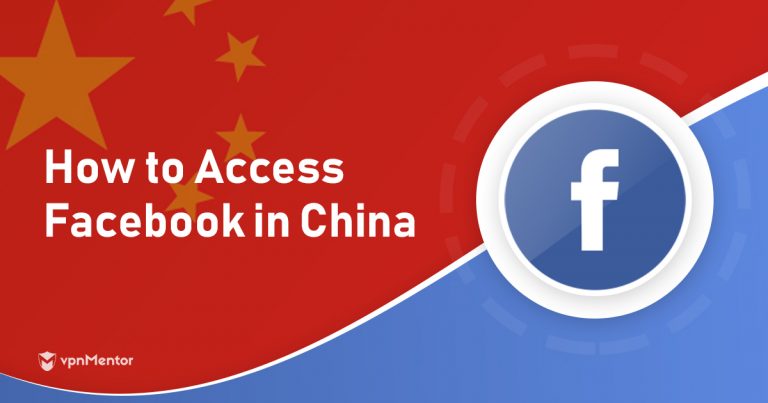



Please, comment on how to improve this article. Your feedback matters!